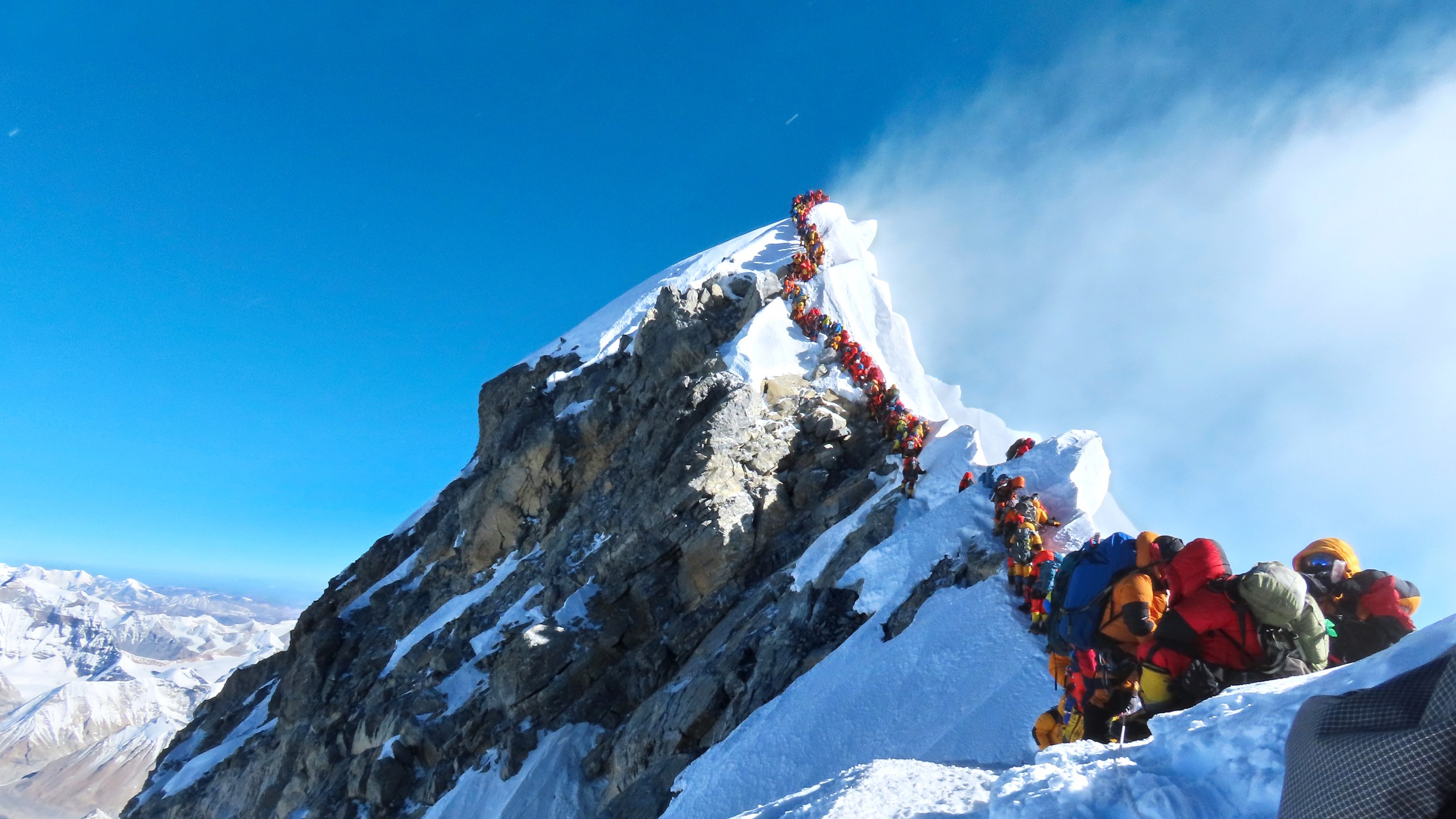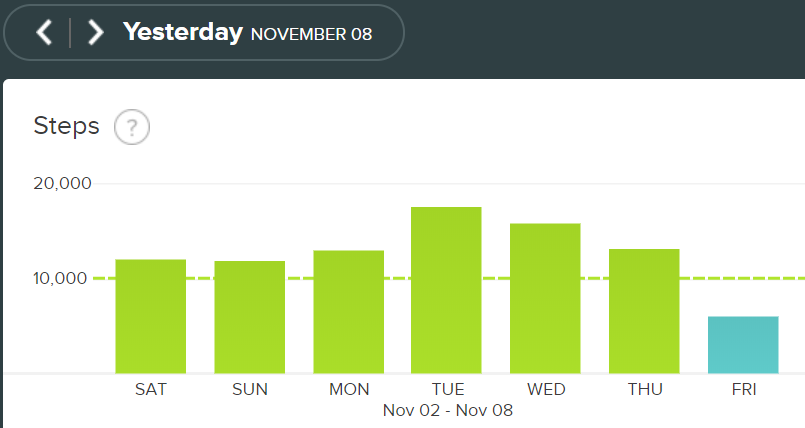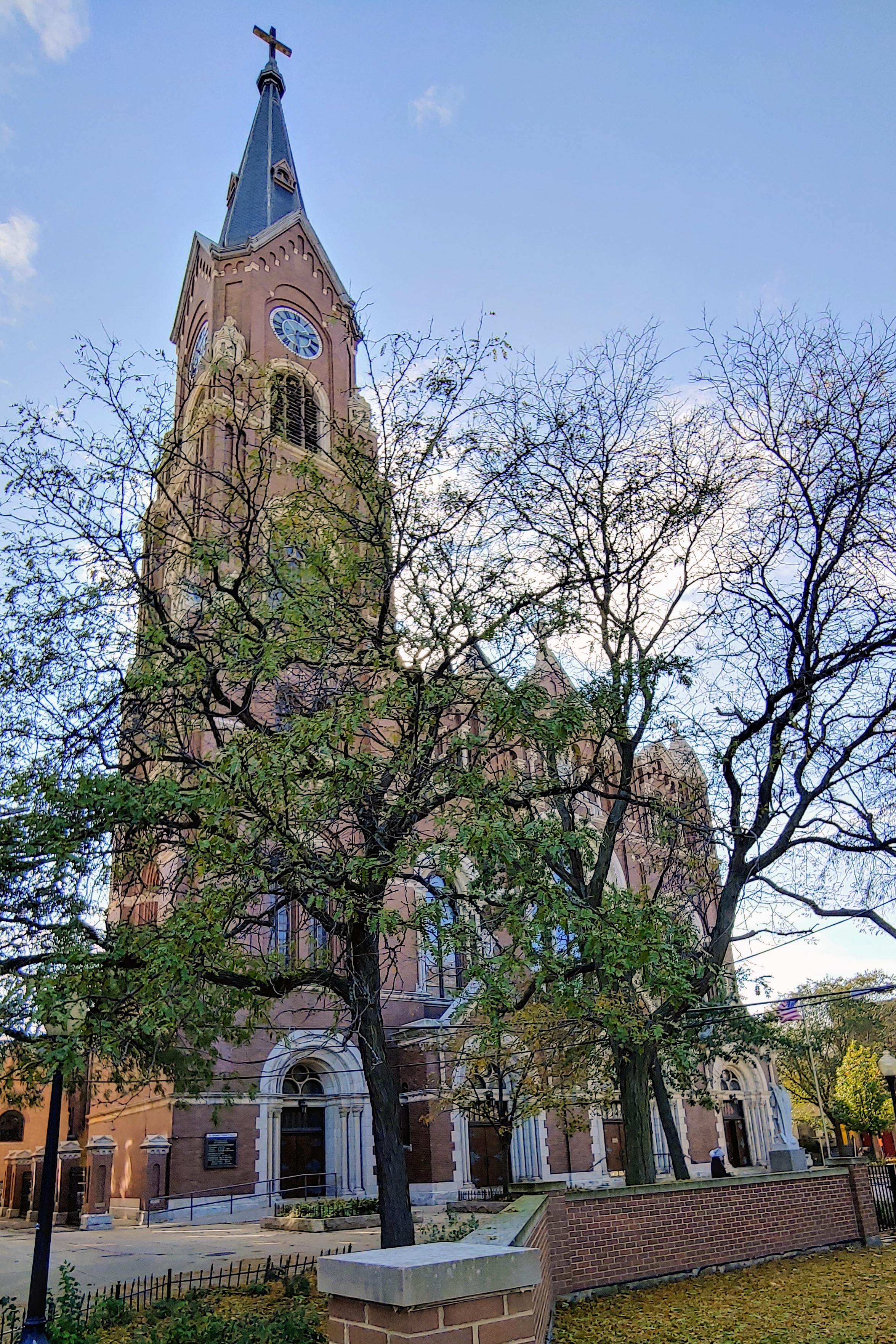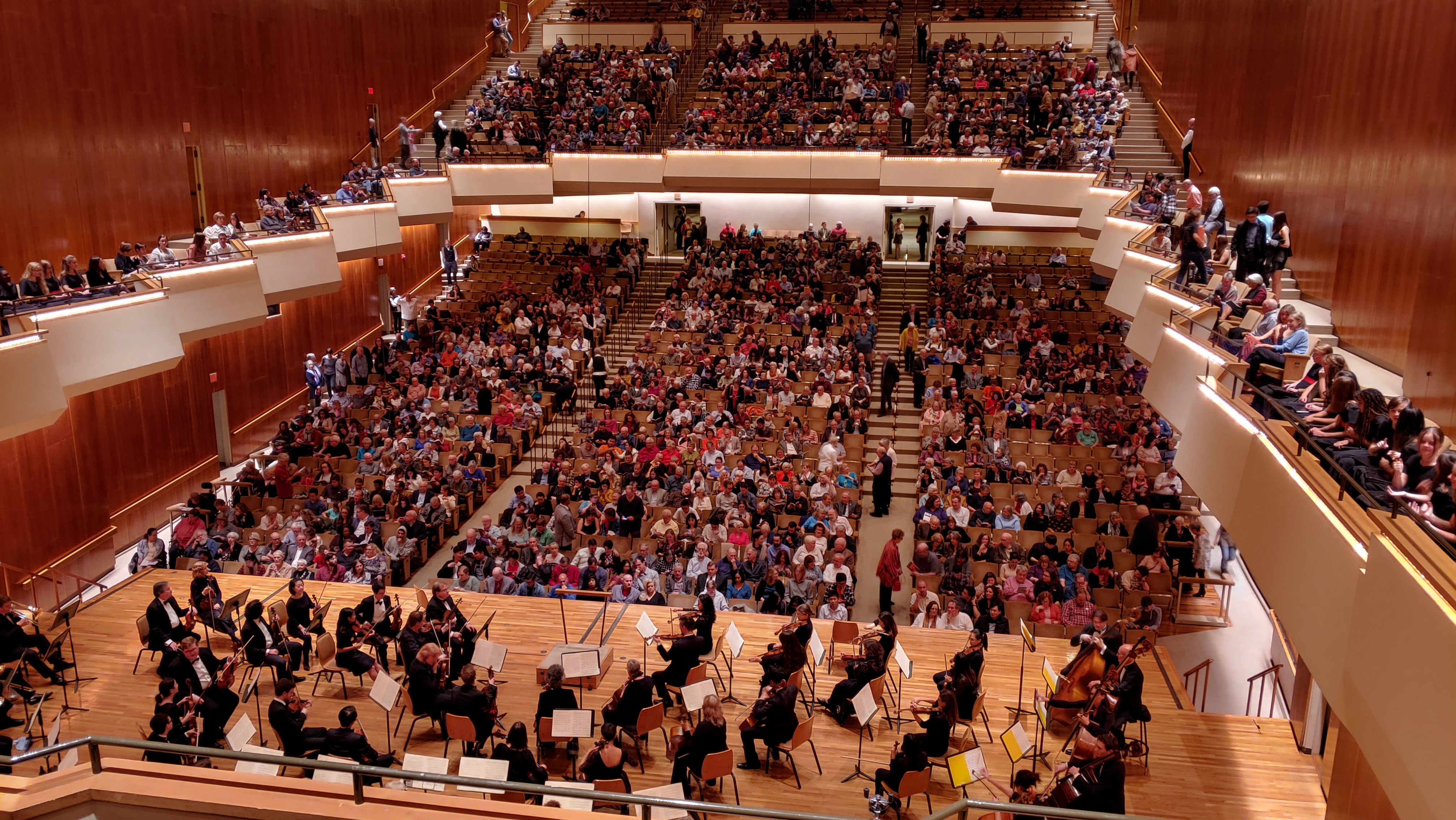The Apollo Chorus performed Joby Talbot's Everest a few weeks ago, and to prepare for the opera I read Jon Krakauer's Into Thin Air. (The opera is based on the events described in that book.) I concluded that climbing Mt Everest is insane.
That didn't stop about 100 climbers from attempting to summit on May 23rd of this year, contributing to one of the deadliest days in the mountain's history:
[T]wo decades on, the Everest experience often seems to have devolved even further into a circus-like pageant of stunts and self-promotion. In April 2017, DJ Paul Oakenfold outraged mountaineering purists by hosting an EDM concert at the base camp in Nepal; this year three Indian climbers returned home to celebratory crowds after they supposedly summited on May 26, only to be accused of fraud after other mountaineers claimed that they never made it past 23,500 feet.
And then there are the growing crowds. For this year's climbing season, Nepal handed out 381 permits to scale Everest, the most ever. The Chinese government distributed more than 100 permits for the northern side. According to the Himalayan Database, the number of people summiting Everest has just about doubled in the past decade. And in that time the mountain has become accessible even to relative novices, thanks to a proliferation of cut-rate agencies that require little proof of technical skill, experience, or physical fitness. “Some of these companies don't ask any questions,” says Rolfe Oostra, an Australian mountaineer and a founder of France-based 360 Expeditions, which sent four clients to the summit this year. “They are willing to take anybody on, and that compounds the problems for everyone.”

On May 22—the day before Grubhofer reached the top—a long line near the summit had already begun to form. One of those pinned in the throng was a Nepali climber named Nirmal Purja. That morning, Purja snapped a photo of the chaos. The picture showed a near unprecedented traffic jam on the popular southern side: a column of hundreds of climbers snaking along the knifelike summit ridge toward the Hillary Step, the last obstacle before the top, packed jacket-to-jacket as if they were queued up for a ski lift in Vail. The image rocketed around the world and, as the events on the mountain were still developing, raised an urgent question: What the hell is going on atop Mount Everest?
I still think these people are crazy. If I ever see Mt Everest, it will be from the pressurized cabin of a transport-class airplane. I'm fine with that.
I will, however, see the opera again when it comes to the Barbican on June 20th.
Somehow, it's December again: winter in the northern hemisphere. Another 8 weeks of sunsets before 5pm, sunrises after 7am, and cold gray skies. At least it builds character.
For me, it also means two weeks of non-stop Händel. Rehearsals tomorrow, Thursday, next Monday, and next Wednesday; performances Tuesday, Friday, and on the 14th and 15th.
Two of those won't be Apollo performances per se. On Tuesday a few of us will visit a local retirement community and help out with their annual sing-a-long of Part 1. We go every year and apparently they keep asking us to come back. Then on Friday, some of us are volunteering for a local church's performance of Parts 1 and 2, another event they keep asking us to come back for. We must be doing something right. (Not to mention, this will be our 140th year doing Messiah, so we've had some practice.)
As Gordon Sondland throws the president under the bus (probably because (a) he's under oath and (b) the president would do it to him soon enough), there are actually a lot of other things going on in the world:
More work to do now.
Chicago Classical Review attended our performance of Everest and Aleko this weekend:
There are a myriad of reasons why an operatic adaptation of Jon Krakauer’s Into Thin Air should not work. And yet it does. Composer [Joby] Talbot and librettist Gene Scheer have crafted a compelling 70-minute opera adapted form Krakauer’s nonfiction book about the disastrous 1996 Everest expedition in which eight people died.
Scheer wisely narrows the scope to three mountaineers, alternating their increasingly desperate situation on the South Summit with communications with their concerned loved ones and the base camp. The large vocal ensemble in back acts as a kind of Greek Chorus, questioning the men, offering philosophical observations, and commenting on the climbers’ actions, and the fates of the many who have died attempting to reach the summit.
The Apollo Chorus delivered all the power, mystery and atmosphere of Talbot’s choral passages, directed by Stephen Alltop.
The Stage & Cinema blog also gave us a nice review.
Not to mention, we really enjoyed the works. And the performance. Plus, Scheer and Talbot came to the cast party afterwards.
The audience loved last night's performance of Everest and Aleko. Everest composer Joby Talbot and librettist Gene Scheer attended, and I had the opportunity to meet them backstage at intermission. They both reported being overjoyed by our performance. Nice.
I discovered in researching this post that the BBC Symphony Orchestra will perform Everest at the Barbican on 20 June 2020. Hell yes, I'm going.
If you don't want to wait until June, you can hear us this afternoon at Harris Theater.
In about four hours, I'll be warming up for tonight's double bill of Everest and Aleko with the Chicago Opera Theater. Chicago's last remaining classical radio station, WFMT, went to our rehearsal on Monday (when I was in London, unfortunately for me):
n this staging, both works employ a large chorus made up of over 100 members, including members of Apollo Chorus of Chicago. Their function, Yankovskaya explains, is akin to a Greek Chorus: "In Everest, the chorus serves as the voice of the mountain often or the voice of the people of the past who have climbed the mountain. In Aleko, likewise, the chorus is often commenting on the surroundings and creating an atmosphere."
In the piece "The lights have gone out" from Aleko, the chorus "creates a sense of time and place," Yankovskaya shares. "The lights have all gone out in the Roma tents. The travelers are going to sleep, and the two lovers, Zemfira and the Young Gypsy, are about to come out and have their duet. But before that happens, we hear this setting created by the chorus."
WFMT posted video from the rehearsal.
You want tickets? We got tickets. PM me for a discount code.
My 207-day streak of 10,000 steps per day ended, as I suspected it would, at midnight GMT tonight.
Traveling from Chicago to London takes 6 hours out of the day, and it's hard to get enough steps before 7am to get to 10k by 6pm when most of that time is on an airplane.
Anyway, I'm in the Ancestral Homeland, about to finish the book that inspired the opera I'm performing in next week.
And then there's the other opera that requires I sing rapidly in Russian, without rushing. I brought the score for that one so I don't lose out on missing Monday's rehearsal.
More later. I actually have to get in sync with GMT so I can function on Monday. Wish me luck.
It was a lovely afternoon for a concert. We performed selections from Händel's Messiah, Rachmaninoff's Aleko, and Bach's St John Passion in the gorgeous St Michael Catholic Church in Old Town, Chicago:

Inside, just before the concert:

Our next performances will be with Chicago Opera Theater on the 14th, 16th, and 17th. Then some of us will be back at St Michael for Messiah on December 6th.
It's going to be a hectic couple of months.
What I did on my autumn vacation:

About once a year the Apollo Chorus does a day-trip to somewhere nearby. Yesterday we went to the Krannert Center for the Performing Arts in Champaign, Ill., on the University of Illinois campus. Fun but exhausting.
October began today for some of the world, but here in Chicago the 29°C weather (at Midway and downtwon; it's 23°C at O'Hare) would be more appropriate for July. October should start tomorrow for us, according to forecasts.
This week has a lot going on: rehearsal yesterday for Apollo's support of Chicago Opera Theater in their upcoming performances of Everest and Aleko; rehearsal tonight for our collaboration Saturday with the Champaign-Urbana Symphony of Carmina Burana; and, right, a full-time job. (The Dallas Opera put their video of Everest's premiere on YouTube.)
We also have a few things going on in the news, it seems:
I will now return to reverse-engineering a particularly maddening interface.